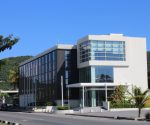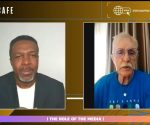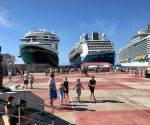Talk of the town
The Maximus-trial is the talk of the town in Willemstad. NOS correspondent Dick Drayer shed his light on the case in his blog De Achterkant van Curacao. These are his observations.
“Almost four years after the murder of the Curacaolenean politician Helmin Wiels it starts to become clear who are behind this political murder. The principals come from the gambling sector but also from within politics. That is what the Public Prosecutor’s Office claimed during the first day of the Maximus-trial, a case that should in the end get political heavyweights behind bars, the public prosecutor promised.
Those heavyweights were mentioned loud and clear; names that have been going around in the streets for years. The big organizer is allegedly the former Minister of Finance George Jamaloodin. He is a member of the MFK, the party of Gerrit Schotte. He is also the half-brother of gambling boss Robbie dos Santos. Both Jamaloodin and Dos Santos were mentioned by a large number of witnesses in the case against Nini Fonseca, the man who was the link between the principals and the killers.
The motive of the principals is according to the prosecution probably the intervention of Wiels with the gambling industry in Curacao and St. Maarten. Shortly before his death, on May 3, 2015, Wiels delivered a speech in which he accused the industry of fraud and tax evasion. He waved with a dossier on that occasion and he said he would send it to several people if something would happen to him.
Two days later he was shot to death on the beach at Marie Pompoen. The dossier was sent out indeed, but it was far from complete and certainly not unambiguous. This is the reason that it took four years before the first Maximus-trial could take place this week.
Jamaloodin was arrested last month in Venezuela and he is awaiting his extradition to Curacao.
Gerrit Schotte who will take part in the elections next week, was also mentioned by the prosecutor. In the months before the murder there were phone contacts between the former prime minister and Fonseca. That appears from data investigators found on the phone of the murder broker, the label the prosecutor’s office gave Fonseca.
But Schotte is at this moment formally not a suspect. His party MFK did receive financing from gambling boss Robbie dos Santos, so the connections between that party, the gambling industry and Schotte are worth a closer look.
The prosecution did not go into the question whether Dos Santos was the financier of the murder or the one who gave the order to kill Wiels. Both are possible as well, but that does trigger the question why Dos Santos would choose such a heavy method for the couple of millions of additional dollars he made with the SMS-lotteries Wiels referred to.
The investigation continues, the prosecutor said. It is indeed plausible that justice will figure out through the follow-the-money trail who within the gambling industry was bothered the most by Helmin Wiels’ long nose.
At the famous snèk I heard names of well-known Curacaoleneans, renowned trust offices, consultancy companies, law offices and more politicians who saw Wiels as their most important enemy. One of them is a ‘friend’ Elmer Kadè Wilsoe, a fellow party member of Helmin Wiels and a former minister of justice in the Schotte cabinet.
Lo and behold – that name was mentioned in the courtroom. The former Lt. Governor allegedly lured Wiels to the spot where it was supposed to happen on that sunny spring afternoon in 2013; the beach of Marie Pompoen.
Those who put together the pieces of the puzzle of Wilsoe’s time in office as a minister see the contours of the principals slowly appear. Think about the letter from Wilsoe to Hillary to liberate $48 million of Dos Santos and about the legal advisors of Schotte, Dos Santos and Wilsoe; they are all ideological enemies of Helmin Wiels.
For Curacao it is evident that the case will be solved completely. During the trial this week it became clear that Jamaloodin allegedly gave the order for the murder because Wiels had broken his political alliance with coalition partner MFK.
The case is therefore still keeping politics in a chokehold. How free are politicians on the island to say what they want and more importantly: how free are they to execute policy on behalf of the people? Which powers are going so far that they will liquidate a politician and up to what point are those powers still playing a role today?
With the trial and the revelations by the public prosecutor the choice for the electorate seems to be again between the mafia and good governance. Just like in 2012 and 2016; and all this while the island is desperate for a government that tackles the problems of the island and its people.”
























